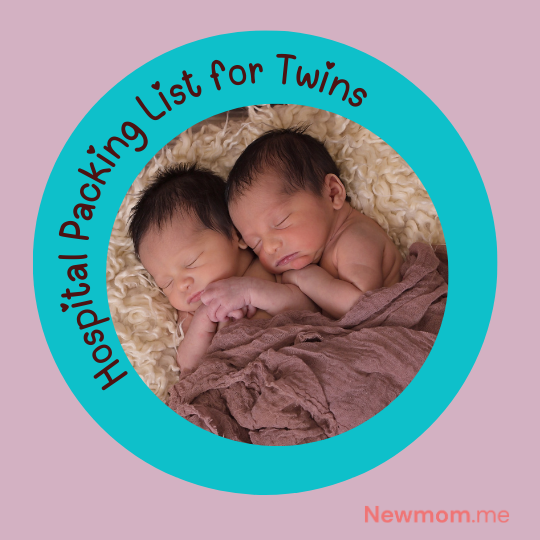Key Takeaways
• Pack hospital bags by 34th week for twins
• Bring essentials for mom, babies, and feeding supplies
• Hospitals provide basics but personal items increase comfort
Expecting twins is an exciting, albeit slightly overwhelming, adventure. As a first-time mom, you’re probably wondering how to prepare for the grand arrival of your duo. Packing your hospital bag is a crucial step in your preparation, ensuring you have everything you need for a comfortable stay for you and your babies. Here’s a comprehensive packing list tailored for the unique needs of a mom expecting twins.
For Mom
Essentials:
- Identification and Paperwork: Bring your ID, insurance card, and any hospital paperwork you've completed in advance.
- Comfortable Clothing: Pack loose, comfortable clothing for your stay and something to wear home. Consider that your body will need time to adjust post-delivery.
- Nursing Bras and Breast Pads: Even if you’re not sure about breastfeeding, these will come in handy for support and any initial leakage.
- Toiletries: Don’t forget your toothbrush, toothpaste, hairbrush, deodorant, face wash, and other personal care items.
- Comfort Items: Such as your own pillow, a blanket, and slippers or flip-flops.
- Tech Needs: Charger for your phone and any other device you plan to bring.
Health and Recovery:
- Prescribed Medications: If you're on any medications, make sure to bring them along.
- Postpartum Care Items: The hospital usually provides some items, but you may prefer to bring your own maternity pads, nipple cream, and a peri bottle.
For Babies
Clothing and Essentials:
- Onesies: Bring at least four to six onesies. Newborns can go through clothing quickly!
- Swaddle Blankets: Hospitals typically provide these, but you might want to bring your own, especially for cute photos.
- Hats and Socks: Keep those tiny heads and feet warm with a couple of hats and pairs of socks.
- Going Home Outfits: Have a special outfit for each baby to wear home. Remember, it needs to be season-appropriate.
Feeding:
- Bottles and Formula: If you plan on formula feeding entirely or supplementing, pack what you’ll need.
- Breast Pump: If you intend to breastfeed, you might want to start pumping early to stimulate supply. Check if the hospital provides one you can use during your stay.
Diapering:
- Diapers and Wipes: The hospital will likely provide some, but it’s good to have extra on hand, especially for two!
General Tips
- Pack Early: Aim to have your bags packed by the 34th week of pregnancy. Twins often come earlier than the due date.
- List of Important Contacts: Have a list of people to call or text once the twins arrive.
- Snacks and Water Bottle: Hospital food might not always be available when hunger strikes in the middle of the night.
- Documentation for Twins: Keep a small notebook or app ready to track feeding, diaper changes, and any medication for each baby, which can be crucial in the early days.
Preparing for the arrival of twins is no small feat, but having your hospital bag ready can ease some of the anxieties about D-day. Remember, while it’s important to be prepared, the hospital will have the necessities covered in case you forget something. Focus on your excitement about meeting your new babies, and rest assured that you’ve got this, mama!
Also, remember to have all the necessary documentation when leaving the hospital after labor. Read this blog post to guide you through the essential documents new mothers should receive upon discharge in the USA.
At Newmom.me, we’re here to transform the motherhood narrative and make this process of finding support so much easier on you. We have a carefully curated, easy-to-use, and customizable platform where you can search by the type of service you need, location, and availability. You can easily sign up to review profiles of Lactation Consultants, Doulas, Mother’s helpers, and other services. Let us help you embrace motherhood with a full heart.





-9.png)
-8.png)
-7.png)